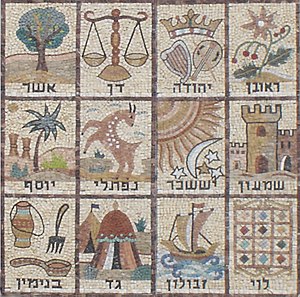 Image via Wikipedia
Image via WikipediaIn these last three chapters of Genesis, we read about Jacob giving his final blessing to his sons. Actually, Jacob said in Genesis 49:1 that he wanted to tell them what was to happen in the days to come and to undserscore God's covenant promise with Israel, that their future is in the land of Canaan. So, he gathered his sons to highlight an aspect of the character of each so that they would understand how they, as men, fit into a future that God would unfold. Reuben, his first born tried to usurp his father’s authority by sleeping with his father’s concubine. That act not only disqualified him from the rights of the first-born but also cemented a character trait of indecisiveness (turbulent as water) which would prevent him from excelling.
Simeon and Levi, the next two sons, massacred the men of Shechem after they, in good will, submitted to circumcision. United, these brothers exhibited such cruelty, that God chose to disperse them throughout Israel
Zebulon would live by the Mediterranean .
Issachar ultimately settled in Esdraelon where he was often subject to invaders.
Dan was supposed to provide justice, but chose treachery. The first practice of idolatry appeared in Dan (Judges 18:30).
Gad was able to attack when attacked. His descendants were vulnerable to the raids of the Moabites to the south.
Asher settled in the fertile farmlands of the Mediterranean so this tribe enjoyed prosperity.
Naphtali became a free mountain people.
Ephraim and Manasseh, Joseph’s two sons, with the younger blessed more abundantly than the elder, were named as two tribes of Israel Israel
Benjamin’s descendants were to have a savage streak (see Judges 3: 12- 30; Judges 19 -21; 1 Samuel 11 -15).
But in the midst of these pronouncements, in verse 18, Jacob utters a prayer, “For Thy salvation I wait, O lord.” The Hebrew word for salvation is yeshua which means deliverance, help, health, welfare, aid, victory. As Jacob, who described himself as a sojourner in this life, prayed for the Lord’s deliverance, one might have to ask why this prayer was spoken here. Perhaps when Jacob saw glimpses of what the future would hold for his progeny, he prayed on their behalf so that they would remember to wait for their Deliverer, their Meshiach, and their Yeshua. Perhaps, what Jacob really understood and grieved about was that through sin all of his descendants were flawed and in some way crippled. Just maybe he was praying for deliverance from sin and all of the suffering which necessarily follows. Yeshua ben Joseph, born to a Judean couple of the Davidic some 1700 years later, came to be known to the world by the Greek name of Jesus Christ.
So Jacob’s prayer is “For Thy Yeshua I wait, O Lord.” (Genesis 49:18)
Jacob understood that all of his son's were flawed but that the One in whom he placed his trust and hope was perfect and true. He understood that God would work with what he had no matter how bad or insufficient a person was. God himself provides the lacking aspects of character or talent. He only wants us to trust in Him; in His love for us; in desire to give us His best; in His ability to bring about what he promised.
Jacob understood that all of his son's were flawed but that the One in whom he placed his trust and hope was perfect and true. He understood that God would work with what he had no matter how bad or insufficient a person was. God himself provides the lacking aspects of character or talent. He only wants us to trust in Him; in His love for us; in desire to give us His best; in His ability to bring about what he promised.

No comments:
Post a Comment